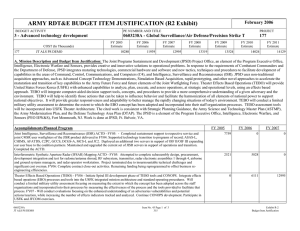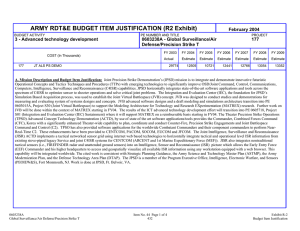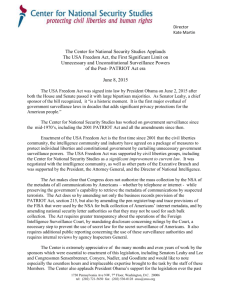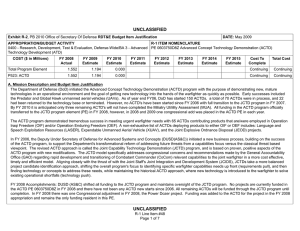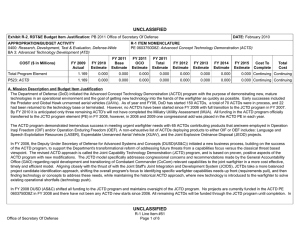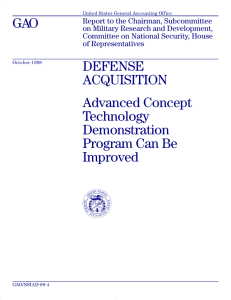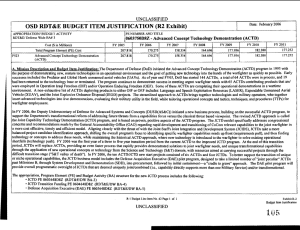ARMY RDT&E BUDGET ITEM JUSTIFICATION (R2 Exhibit)
advertisement
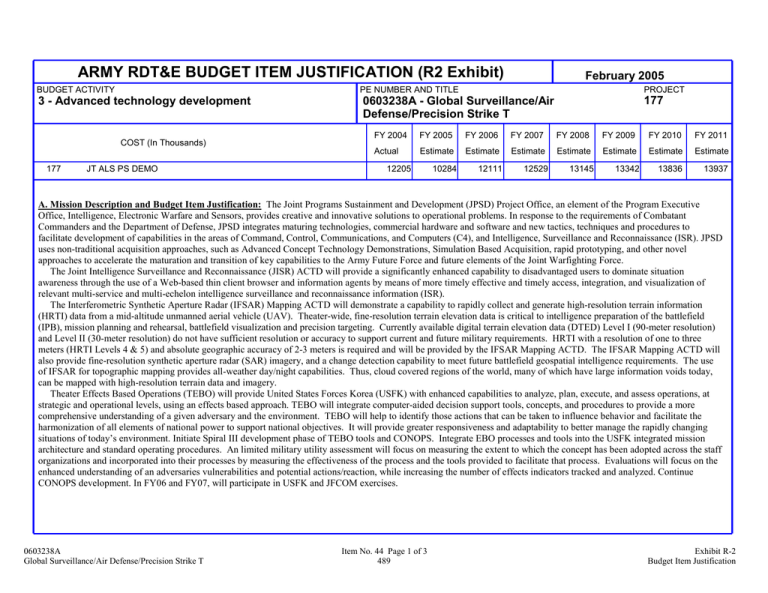
ARMY RDT&E BUDGET ITEM JUSTIFICATION (R2 Exhibit) BUDGET ACTIVITY 3 - Advanced technology development COST (In Thousands) 177 JT ALS PS DEMO February 2005 PE NUMBER AND TITLE PROJECT 177 0603238A - Global Surveillance/Air Defense/Precision Strike T FY 2004 FY 2005 FY 2006 FY 2007 FY 2008 FY 2009 FY 2010 FY 2011 Actual Estimate Estimate Estimate Estimate Estimate Estimate Estimate 13836 13937 12205 10284 12111 12529 13145 13342 A. Mission Description and Budget Item Justification: The Joint Programs Sustainment and Development (JPSD) Project Office, an element of the Program Executive Office, Intelligence, Electronic Warfare and Sensors, provides creative and innovative solutions to operational problems. In response to the requirements of Combatant Commanders and the Department of Defense, JPSD integrates maturing technologies, commercial hardware and software and new tactics, techniques and procedures to facilitate development of capabilities in the areas of Command, Control, Communications, and Computers (C4), and Intelligence, Surveillance and Reconnaissance (ISR). JPSD uses non-traditional acquisition approaches, such as Advanced Concept Technology Demonstrations, Simulation Based Acquisition, rapid prototyping, and other novel approaches to accelerate the maturation and transition of key capabilities to the Army Future Force and future elements of the Joint Warfighting Force. The Joint Intelligence Surveillance and Reconnaissance (JISR) ACTD will provide a significantly enhanced capability to disadvantaged users to dominate situation awareness through the use of a Web-based thin client browser and information agents by means of more timely effective and timely access, integration, and visualization of relevant multi-service and multi-echelon intelligence surveillance and reconnaissance information (ISR). The Interferometric Synthetic Aperture Radar (IFSAR) Mapping ACTD will demonstrate a capability to rapidly collect and generate high-resolution terrain information (HRTI) data from a mid-altitude unmanned aerial vehicle (UAV). Theater-wide, fine-resolution terrain elevation data is critical to intelligence preparation of the battlefield (IPB), mission planning and rehearsal, battlefield visualization and precision targeting. Currently available digital terrain elevation data (DTED) Level I (90-meter resolution) and Level II (30-meter resolution) do not have sufficient resolution or accuracy to support current and future military requirements. HRTI with a resolution of one to three meters (HRTI Levels 4 & 5) and absolute geographic accuracy of 2-3 meters is required and will be provided by the IFSAR Mapping ACTD. The IFSAR Mapping ACTD will also provide fine-resolution synthetic aperture radar (SAR) imagery, and a change detection capability to meet future battlefield geospatial intelligence requirements. The use of IFSAR for topographic mapping provides all-weather day/night capabilities. Thus, cloud covered regions of the world, many of which have large information voids today, can be mapped with high-resolution terrain data and imagery. Theater Effects Based Operations (TEBO) will provide United States Forces Korea (USFK) with enhanced capabilities to analyze, plan, execute, and assess operations, at strategic and operational levels, using an effects based approach. TEBO will integrate computer-aided decision support tools, concepts, and procedures to provide a more comprehensive understanding of a given adversary and the environment. TEBO will help to identify those actions that can be taken to influence behavior and facilitate the harmonization of all elements of national power to support national objectives. It will provide greater responsiveness and adaptability to better manage the rapidly changing situations of today’s environment. Initiate Spiral III development phase of TEBO tools and CONOPS. Integrate EBO processes and tools into the USFK integrated mission architecture and standard operating procedures. An limited military utility assessment will focus on measuring the extent to which the concept has been adopted across the staff organizations and incorporated into their processes by measuring the effectiveness of the process and the tools provided to facilitate that process. Evaluations will focus on the enhanced understanding of an adversaries vulnerabilities and potential actions/reaction, while increasing the number of effects indicators tracked and analyzed. Continue CONOPS development. In FY06 and FY07, will participate in USFK and JFCOM exercises. 0603238A Global Surveillance/Air Defense/Precision Strike T Item No. 44 Page 1 of 3 489 Exhibit R-2 Budget Item Justification ARMY RDT&E BUDGET ITEM JUSTIFICATION (R2 Exhibit) BUDGET ACTIVITY 3 - Advanced technology development February 2005 PE NUMBER AND TITLE PROJECT 177 0603238A - Global Surveillance/Air Defense/Precision Strike T Leave integrated operational tools and processes supporting EBO in the USFK theater architecture. The cited work is consistent with Strategic Planning Guidance, the Army Science and Technology Master Plan (ASTMP), the Army Modernization Plan, and the Defense Technology Area Plan (DTAP). The JPSD is a element of the Program Executive Office, Intelligence, Electronic Warfare, and Sensors (PEO IEW&S), Fort Monmouth, NJ. Work is done at JPSD, Ft. Belvoir, VA. Accomplishments/Planned Program Joint Intelligence, Surveillance and Reconnaissance (JISR) ACTD - FY04: Refined and enhanced interoperability reviews of Defense Information Infrastructure/ Common Operating Environment (DII/COE) certification from appropriate certification authorities to include DISA. Transition Memoranda of Agreements have been accomplished with programs of records, ASASL, CHIMS, DCGS-A, Advanced Field Artillery Tactical Data Systems (AFATDS), AND C2PC. In the JISR 2.0 release, JISR will be platform independent, operating both on windows and unix. In September of FY05, JISR will be transitioned fully into Counter Intelligence/Human Intelligence Management Systems (CHIMS), Command Control Personal Computer (CZPC), and Distributed Data and Visualization and Mangement (DDVM). FY05: - Complete sustainment support to respective service and joint C4ISR user warfighters of the JISR product delivered in FY04. Supported technology transition to programs of record; ASAS-L, CHIMS, AFATDS, C2PC, GCCS, DCGS-A, MCS-L and JC2. Deployed an additional two servers in support of OIF II/OIF III expanding our user base to the coalition partners. Maintained and upgraded the current set of JISR servers in support of operations and transition. Completed the ACTD. Interferometric Synthetic Aperture Radar (IFSAR) Mapping ACTD – FY05: Complete subassembly design, procurement, development integration and test for radome/antenna shroud, RF subsystem, transmitter, radar electronic assemblies 1 through 4, airborne and ground systems managers, and radar operator workstation. FY06: Complete system integration and test for all elements of Tactical IFSAR sensor Unit #1, including environmental testing. Deliver Unit #1 to Rancho Bernardo for integration testing into Predator-B and developmental flight testing. 0603238A Global Surveillance/Air Defense/Precision Strike T Item No. 44 Page 2 of 3 490 FY 2004 FY 2005 FY 2006 FY 2007 12205 7763 0 0 0 2521 5727 0 Exhibit R-2 Budget Item Justification ARMY RDT&E BUDGET ITEM JUSTIFICATION (R2 Exhibit) BUDGET ACTIVITY 3 - Advanced technology development Theater Effects Based Operations (TEBO) - FY06/07 – Initiate Spiral III development phase of TEBO tools and CONOPS. Integrate EBO processes and tools into the USFK integrated mission architecture and standard operating procedures. Will conduct a limited military utility assessment focusing on measuring the extent to which the concept has been adopted across the staff organizations and incorporated into their processes by measuring the effectiveness of the process and the tools provided to facilitate that process. Conduct evaluations focusing on the enhanced understanding of an adversaries vulnerabilities and potential actions/reaction, while increasing the number of effects indicators tracked and analyzed. Continue CONOPS development. Participate in USFK and JFCOM exercises. Totals Previous President's Budget (FY 2005) Current Budget (FY 2006/2007 PB) Total Adjustments Net of Program/Database Changes Congressional Program Reductions Congressional Rescissions Congressional Increases Reprogrammings SBIR/STTR Transfer Adjustments to Budget Years 0603238A Global Surveillance/Air Defense/Precision Strike T PROJECT 177 0603238A - Global Surveillance/Air Defense/Precision Strike T Accomplishments/Planned Program A(continued) B. Program Change Summary February 2005 PE NUMBER AND TITLE FY 2005 10721 10284 -437 FY 2006 FY 2004 FY 2005 FY 2006 FY 2007 0 0 6384 12529 12205 10284 12111 12529 FY 2007 12441 12111 -330 12766 12529 -237 -330 -237 -155 -282 Item No. 44 Page 3 of 3 491 Exhibit R-2 Budget Item Justification

